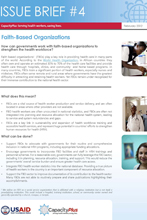
How Can Governments Work with Faith-Based Organizations to Strengthen the Health Workforce?
CapacityPlus announces the publication of Issue Brief #4, Faith-Based Organizations. This brief presents an overview of the issue of FBOs and human resources for health along with suggested actions, key considerations, and resources. FBOs play a key role in providing health care in many parts of the world. According to the World Health Organization, in African countries they often own and operate an estimated 30% to 70% of the health care facilities and provide health care through hospitals, clinics, and community- and home-based programs. In many countries, FBOs train a significant portion of health workers, especially nurses and midwives. FBOs often serve remote and rural areas where governments have the greatest difficulty in attracting and retaining health workers. Yet FBOs remain under-recognized for their immense contribution to the national health sector.
FBOs play a key role in providing health care in many parts of the world. According to the World Health Organization, in African countries they often own and operate an estimated 30% to 70% of the health care facilities and provide health care through hospitals, clinics, and community- and home-based programs. In many countries, FBOs train a significant portion of health workers, especially nurses and midwives. FBOs often serve remote and rural areas where governments have the greatest difficulty in attracting and retaining health workers. Yet FBOs remain under-recognized for their immense contribution to the national health sector.
What does this mean?
- FBOs are a vital source of health worker production and service delivery, and are often located in areas where other providers are not available.
- FBO health workers are often uncounted in national statistics, and FBOs are often not integrated into planning and resource allocation for the national health system, leading to service and system redundancies and gaps.
- FBOs are a key link in sustainability and expansion of health workforce training and accessible health services, and represent huge potential in countries’ efforts to strengthen human resources for health (HRH).
What can be done?
- Support FBOs to advocate with governments for their routine and comprehensive inclusion in national HRH programs, including appropriate funding allocations.
- Encourage governments to incorporate FBO facilities and staff in HRH trainings and personnel schemes. For a reasonable cost, governments can fully leverage the FBO sector, including it in planning, resource allocation, training, and support. This would reduce the governments’ overall service burden and ensure greater health care access.
- Integrate FBO health worker statistics into the national database. Providing a true picture of health workers in the country is an important component of resource allocation.
- Support the FBO sector to improve documentation of its contribution to the health sector. Many FBOs are not able to routinely prepare and share publications highlighting their accomplishments.
Key considerations
- International donor misconceptions about FBO networks need to be addressed. FBOs have not been a major focus of support by many of the large international donors, and some donors inaccurately categorize FBOs as members of the private sector rather than not-for-profit organizations.
- FBOs typically have minimal resources allocated to the development of strong HRH management skills, policies, and systems in their health care facilities. This leads to staff attrition, increases training and deployment costs, and reduces access to care for clients of FBO facilities.
- Further advocacy and resource support are needed to promote the role of professional HR managers to better support FBO health workers and reduce attrition.
See Issue Brief #4 for selected resources and more information. Previous CapacityPlus Issue Briefs focus on the topics of retention, health worker information systems, and HR management.
Related items:


